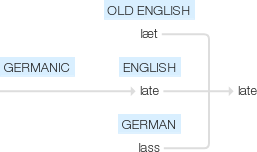Late
Old English læt (adjective; also in the sense ‘slow, tardy’), late (adverb), of Germanic origin; related to German lass, from an Indo-European root shared by Latin lassus ‘weary’, let1, and let2.
wiktionary
From Middle English late, lat, from Old English læt(“slow; slack, lax, negligent; late”), from Proto-Germanic *lataz(“slow, lazy”).
etymonline
late (adj.)
Old English læt "occurring after the customary or expected time," originally "slow, sluggish, slack, lax, negligent," from Proto-Germanic *lata- (source also of Old Norse latr "sluggish, lazy," Middle Dutch, Old Saxon lat, Dutch laat, German laß "idle, weary," Gothic lats "weary, sluggish, lazy," latjan "to hinder"), from PIE *led- "slow, weary," from root *lē- "to let go, slacken."
From mid-13c. as "occurring in the latter part of a period of time." From c. 1400 as "being or occurring in the near, or not too distant, past; recent" (of late). From this comes the early 15c. sense "recently dead, not many years dead" (as in the late Mrs. Smith). Of menstruation, attested colloquially from 1962. Expression better late than never is attested from late 15c. As an adverb, from Old English late "slowly."
